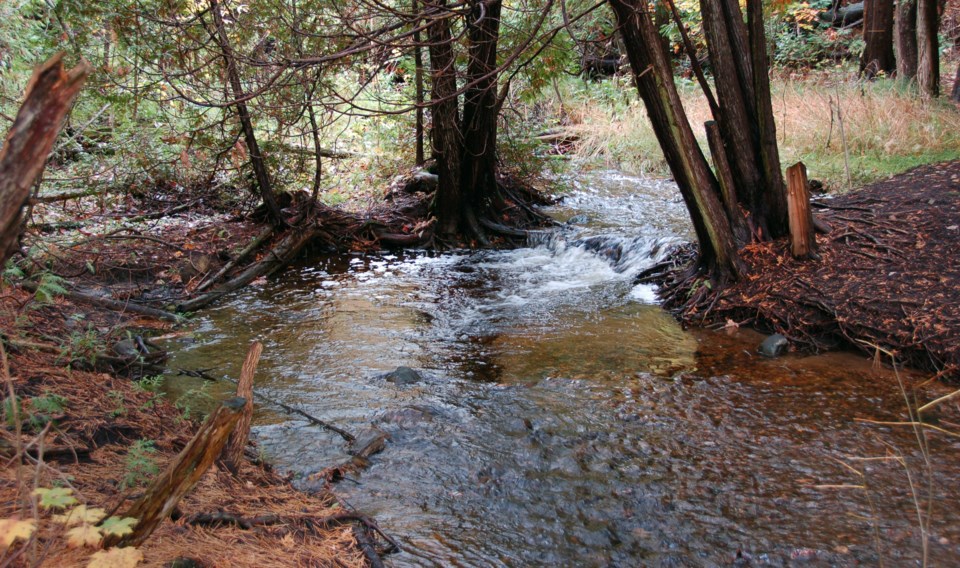April is turning into a long succession of soggy days, which I suppose is good for the garden but not for our spring-enthralled selves.
However, we are not the only ones waiting impatiently for warm and sunny days. So, too, are the blackflies.
Living in paradise as we do around the Great Lakes, there is payment due to balance the good with the bad — and blackflies, mosquitoes, ticks, deer flies, horse flies and yellow jackets each have an assigned part of the summer to keep us mindful that we are not alone.
They say it helps to know your enemy; wise words as, soon, each time you leave the safety and comfort of your home, you run the risk of encountering squadrons, battalions and great, huge numbers of blackflies and mosquitoes.
Lots of good news/bad news about blackflies.
Good news: Only half the population is after you — the females. The girls need a blood meal to gain the protein needed for egg production. However, bad news, resulting from a bit of research, it appears more than half the population is after you as the ratio of males to females is 1:7.
Bad news: There are more than 40 species of blackflies in central Ontario. Good news: Only four species bite humans. (The other species are pestering birds.) Bad news: The other species may just content themselves to swarm your eyes, ears and nose, but, hey, not bite.
Good news: The male blackflies feed on wildflower nectar and assist with pollination of shrubs such as leatherleaf. Bad news: Blueberries are not high on the list of being pollinated by blackflies. (These flowers are pollinated by solitary bees.)
Blackflies and mosquitoes have very different requirements when it comes to finding a place to live and grow. Both require water, but in opposite states. Blackfly larvae attach themselves to rocks in flowing water, thus allowing fresh oxygen to be carried to them as well as any nutrients to feed upon. Mosquito larvae demand absolutely stagnant water and wriggle from bottom to surface to siphon air through the surface tension.
Another difference between blackflies and mosquitoes is how they extract the blood from your body. Mosquitoes do so like a hypodermic needle, using a long, hollow, pointy mouthpart to suck out the delicious blood meal. However, blackflies, like their cousins, the deer flies, slash a wound in your tender skin and sponge up the resultant mess.
Some people react badly to these bites, while other folks just shrug it off. If I get a blackfly bite, my skin swells up in a sore, itchy lump for two or three days, while my wife just quietly bleeds and cleans herself up with a washcloth. But, ha-ha, the opposite happens with us and mosquitoes: She swells and is miserable whilst I merely swipe them away.
Knowing what attracts these bloodsucking, skin-chomping critters will help you devise a way to be just the opposite — unattractive. (How many articles have you ever read where the self-help topic is on ‘Being Unattractive and Loving It?’)
In regard to what attracts the females, here are a few nuggets of information: They like dark colours, such as black T-shirts, blue denim, and brown hats. (I guess they think you are a moose.) Therefore, wear pastel colours.
Movement is a great way to attract the winged beasties. I laugh (but not out loud) when I see people windmilling the air in an attempt to get rid of a pesky skeeter or two and suddenly find themselves the centre of attention for a whole airborne squadron. So, sit down and relax.
Carbon dioxide is a great lure for tiny things with wings. Every breath you take, every droplet of sweat expelled, releases carbon dioxide into the air. And when that delicious aroma hits the olfactory system of a lady blackfly, she turns into a single-minded entity — find blood, find blood now! So, when it comes to outdoor exercise, just don’t sweat it.
You can thwart them (a bit) by using an insect repellent, but bear in mind the stuff you’re spraying about is a repellent, not an insecticide. To fog the area around you is not killing a single blackfly or mosquito, and it’s not doing much good to those of us standing downwind who breathe in your over-spray. Just a bit on the areas of exposed skin (or a shot on the collar and hat) will keep them from landing.
Citronella wrinkles the nose of a blackfly, as does Vicks VapoRub. Also, I have read swallowing some apple cider vinegar will turn you into a walking, talking blackfly-repelling machine, but I’ve not yet tested that method.
I probably should not mention this next repellent, but tobacco smoke works well at keeping blackflies at bay. When I was younger, so much younger than today, and was working as a land surveyor, I smoked cigarettes while standing at the transit with a cloud of blackflies swarming my juicy neck and face.
Fortunately, about the same time, I met the lovely young woman who would soon become my wife and she was dead set against smoking. End of story.
Blackflies are weak fliers, and a good breeze will send them off course. A couple of resorts I have visited have set up those big square fans on the patios to blow the flies far, far away.
So, if you want to avoid ‘the enemy,’ just relax (no sweat), calm down (no movement), wear a great-looking summer shirt (not black) and don’t exhale while out of doors. It’s simple, really, except for that no breathing part. But other than that, get outside and enjoy the season.



